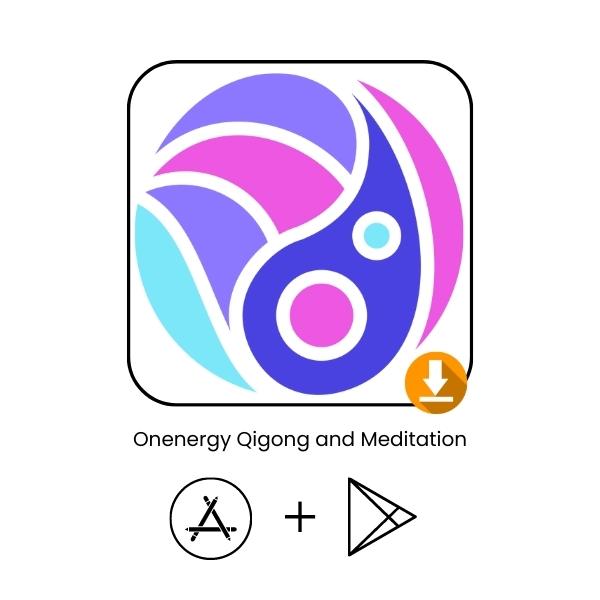The Ultimate Guide of Qigong For Beginners

Let this be your first guide to answer the most frequently asked questions by those new to qigong. We offer more tips and advice in our informative and interactive Qigong Kickstart program. Be sure to read this guide first before heading to the program for Qigong beginners.
This guide is written in the Question and Answer format. Here is the list of questions in this guide:
- How to pronounce “Qigong” and “Chi Kung”?
- What does Qigong mean?
- Is Qigong a religion?
- Where did Qigong originate?
- What does Qigong do?
- Who is Qigong for?
- Is Qigong safe?
- Is Qigong difficult to do?
- What is the difference between Qigong and exercise?
- What is the difference between Qigong and Tai Chi?
- What Qigong master to follow?
- How to start Qigong?
How to pronounce “Qigong” and “Chi Kung”
This is a common question for all non-Chinese qigong beginners. Qigong is actually two words in Chinese, which are qi (氣 or 气 or 炁 in Chinese), and gong (功 in Chinese). That’s why sometimes we write Qi Gong. Qigong and Qi Gong are precisely the same things.
Qigong is the pinyin (pronunciation in Mandarin) version of 气功. Chi Kung is the Cantonese Chinese pronunciation. The video demos both.
What does Qigong mean
Qigong literally means the way to practice qi. Before you learn how to practice qigong, you need to understand what qi (chi) is, what qigong is, and why you need to practice qigong.
What is qi? It’s a big question. The qi we refer to is Hun Yuan Qi (Onenergy). It is the primitive qi, so it has the most power.
No matter how different people explain qi, everyone agrees that qi is something that cannot be measured or detected by man-made machines. Only people who have experienced qi know its existence.
However, even if you haven’t truly experienced qi, qi is always there working on its way. Through qigong, you can possibly work qi to your benefit. However, efficiency depends on how much you can connect and experience qi.
Is Qigong a religion
Qigong is not a religion, nor is it an ideology. It is the way to practice qi. It is more of a science rather than a religion. Science studies cause and effect. You will get certain results if you apply certain scientific rules and formulas. Same as qigong.
No matter what religion you have or if you are an atheist, qigong works the same way. However, qigong can help with spiritual growth and awakening. It might help you better understand your belief.
Where did Qigong originate
Qigong originated in ancient times in China around five thousand years ago, according to the records of ancient books such as “Lv’s Spring and Autumn Period” 《吕氏春秋》.
Through qigong, the ancients understood the unity of humans and nature, the relativeness of motion and motionless, the depletion and growth of Yin and Yang, and the for and against between the five elements. Ancient Chinese wisdom of Tao 道, Yin Yang 阴阳, Five Elements 五行, Ba Gua 八卦, and Chinese medical system 中医 are all different applications of qigong.
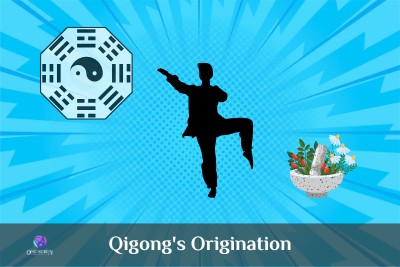
What does Qigong do
Qigong is a way to understand the universe, including galaxies, planets, nature, and humans. Therefore, it can do whatever you can imagine and beyond.
However, 99.9% of people get to know qigong for its healing effects. Therefore, it’s common for beginners to ask what it can do for them.
For the human body and mind, qigong can help cure diseases and improve health. Unfortunately, people think when they have issues, they shall start qigong. However, it’s best to start now to strengthen your system to prevent any health issues.
Who is Qigong for
Although most first-time qigong learners are middle-aged and seniors, anyone can start Qigong regardless of age or health condition. We once taught a qigong program to school-age children. Those kids developed higher intelligence and a more robust immune system than average. When they grew up, they had fewer health issues.
When you easily feel tired or stressed and start to have health issues, your body tells you it lacks life energy to maintain its normal functions. It would be best if you start qigong practice as soon as possible.
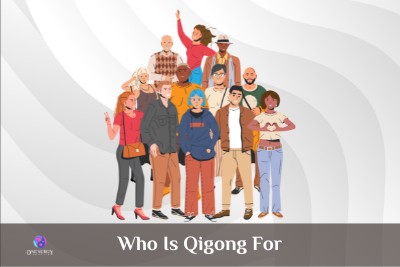
Is Qigong safe
Qigong is a safe and simple practice. For beginners, you will start with some basic movements, which we call preparatory qigong movements.
When you are familiar with the basic movements, we will add some mind movements to the practice.
In advanced practice, minimum body or mind movements are involved. However, you can experience qi more in that level of practice.
Is Qigong difficult to do
Learning the movements is not difficult. Qigong movements don’t involve too much twisting or stretching. However, as a qigong beginner, since you rarely move some body parts, you may find it a bit tiring when practicing certain moves at the beginning.
Just like learning anything new, you must practice regularly to train your body and mind. If you don’t do it enough, you can hardly change the old pattern of how your body and mind work; therefore, you will see limited results. If you follow our teaching and do it consistently, the change will happen pretty quickly. So the key is to be persistent.
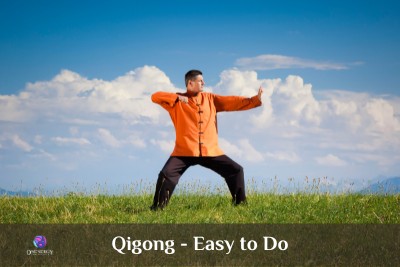
What is the difference between Qigong and exercise
Fitness workouts or exercise focus on physical movements. You will likely sweat during an intensive exercise, and your heartbeats and breathing will fasten. The process is life energy exhaustion which usually leads to body fluid loss. Some workouts may help muscle mass increase but at the cost of overall health.
Qigong focuses on building harmony between body, mind, and qi. Qigong is based on life energy (qi) preservation and cultivation. Therefore it nourishes your life energy. It aims to balance your Yin and Yang and enhance your immune, digestive, cardiovascular, and reproductive functions as a whole.
What is the difference between Qigong and Tai Chi
Tai Chi or Taiji (太极) is shortened from Tai Ji Quan(太极拳), it is one kind of Qigong martial art. Its philosophical and conceptual background is from Taoism and Confucianism. It focuses on transforming internal Qi into pure undifferentiated pure Yang energy.
Tai chi involves more complex choreographed movements coordinated with the breath, done slowly for health and training or quickly for self-defense. The origin of Tai Chi can be traced back to the 17th century, while Qigong has more than 2000 years of history.
Qigong plays a vital role in training for Tai Chi. Many Tai Chi movements are part of qigong practice. The focus of qigong is typically more on health or meditation than martial applications.
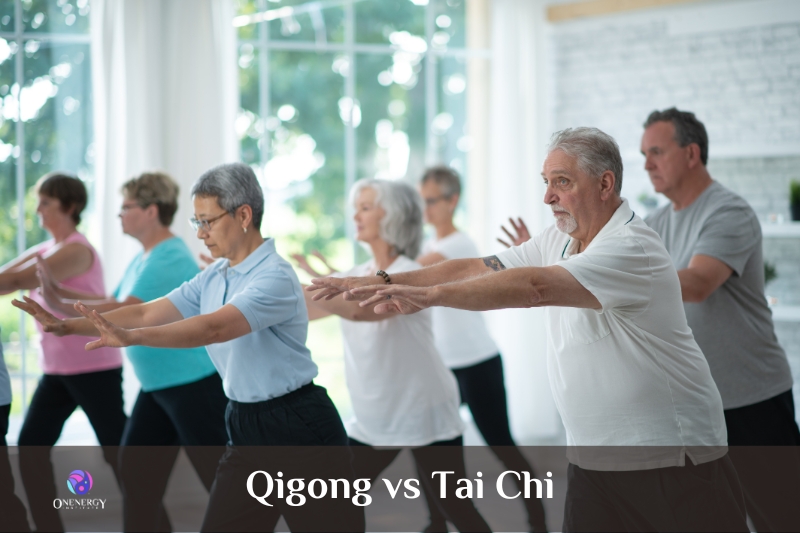
What Qigong Master to follow
This is a great question. As a qigong beginner, if you pick the right qigong master, your learning experience and progress will be totally different.
Whether you have just started or are at the advanced level, you want to follow those who have achieved that profoundness in both qigong knowledge and qi experience.
How do you tell whether the qigong master has reached a profound level? If they mostly do qigong demos and talk about emotions and feelings and can only vaguely explain qi, you know their teaching is superficial.
Also, listen to their stories: why they started qigong, what masters they followed, what they had experienced qi, and how qigong has changed their life. And check whether their career and personal life is successful. How can you be better if your teacher is not at their best?
After all, qigong has a lot to do with Chinese culture and philosophy. A teacher who uses the Chinese language daily and lives the Chinese culture and philosophy will have a solid foundation in qigong teaching.
An enlightened qigong master is not there just to teach the movements or soothe the feeling. Their primary role is to tear down your boundaries so that you can truly experience the essence of qi. If you encounter a great qigong master, you will find supreme clarity and profoundness in their teaching.

How to start Qigong
You don’t need to worry about how to start. A great qigong master can build a lifelong system that can guide you from the beginning and progressively advance to an intermediate and advanced level.
The first step we highly suggest is to take the Onenergy Qigong Kickstart program available at Onenergy Qigong App. It fits any age groups and fitness levels. Whether you are a Qigong beginner or seasonal practitioner, you will achieve your health goals with the help of custom Qigong routines and Gonyo community built in the App. We welcome you to download the App to start a successful self-care journey today! ??

